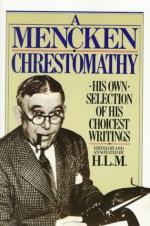
|
| Name: _________________________ | Period: ___________________ |
This test consists of 15 multiple choice questions and 5 short answer questions.
Multiple Choice Questions
1. How does Mencken define government?
(a) A dozen men who can't do anything right.
(b) A conspiracy against superior men.
(c) A collection of the looniest among us.
(d) A war on the poor.
2. What kind of promises do politicians make?
(a) Ones they can fulfill.
(b) Ones they have no intention of fulfilling.
(c) Ones they have polled voters about.
(d) Ones they cannot deliver.
3. What or who rules the American South?
(a) An aristocratic class.
(b) Baptist and Methodist "barbarism".
(c) Secular liberals.
(d) A love for automobiles and technology.
4. Who is the "ideal citizen of Christendom" according to Chapter 3?
(a) An emotionally cold woman.
(b) The hapless hero of a female novel.
(c) Young men drained of passion.
(d) Young men full of passion.
5. What kind of men has history been written by, to date?
(a) Noble men of purpose.
(b) Men more interested in power than factual accuracy.
(c) Third-rate, inferior men.
(d) The most intelligent men, and this is why history cannot be understood by most.
6. How does Mencken describe President Coolidge?
(a) He was an orator of great skill and emotive power.
(b) He was a typical American.
(c) He was reserved and agnostic.
(d) His life was marred by continual misfortune.
7. What is the relationship between free will and morality?
(a) Free will creates several difficulties for morality.
(b) Free will is the cause as well as the effect of morality.
(c) Free will and morality work hand in hand in a positive way.
(d) Free will has no relationship to morality.
8. What does Mencken NOT believe about the possibility for morality to change over time?
(a) Morality can adopt new ideas, like Christian beliefs.
(b) Different subsections of morality can grow over time.
(c) Morality was determined in ancient times, and has not changed.
(d) Morality evolves and grows over time.
9. Who rules American culture, according to Chapter 10?
(a) The learned aristocracy.
(b) The uncivilized mob.
(c) Quacks such as chiropractors.
(d) Psychologists and doctors.
10. Per Chapter 2, what kind of person has Mencken never met?
(a) A metaphysician who was intellectually curious.
(b) A quack with a conscience.
(c) An altruist who actually did good for anybody.
(d) A moral man that was honorable.
11. What was the most damning effect of the Civil War, in regard to the South?
(a) It introduced technology into an innocent and primitive society.
(b) It destroyed the Southern aristocracy.
(c) It replaced religious values with secular ones.
(d) It created the Southern aristocracy.
12. Why does Mencken admire John D. Rockefeller?
(a) For his research foundations.
(b) For his larger-than-life lifestyle.
(c) For his business prowess.
(d) For his political acumen.
13. What is Mencken's assessment of Abraham Lincoln?
(a) He was a bumbler and not fit for office.
(b) He was a practical politician of great talent and rhetoric.
(c) He was an out-and-out racist.
(d) He was a hard-living chauvinist dinosaur.
14. How intelligent are women according to Mencken?
(a) They are completely stupid in thought and deed.
(b) They pretend to be intelligent, but deep down are quite stupid.
(c) They are usually much more intelligent than men.
(d) They pretend to be dumb, but are in fact quite intelligent.
15. Which is NOT one of the features Mencken imagines for the Confederacy, had it survived the Civil War?
(a) It would be a wealthier place.
(b) It would never have abolished slavery.
(c) It would be a more cultured place.
(d) It would have a strong aristocracy in place.
Short Answer Questions
1. What does Mencken see as the problem with contemporary Protestantism?
2. What is Mencken's belief about the concept of sin?
3. What is Mencken's opinion of the belief that man has a soul, according to Chapter 1?
4. In "female novels," how are males portrayed according to Mencken?
5. What aspect of human nature fuels the democratic system of government?
|
This section contains 708 words (approx. 3 pages at 300 words per page) |

|




